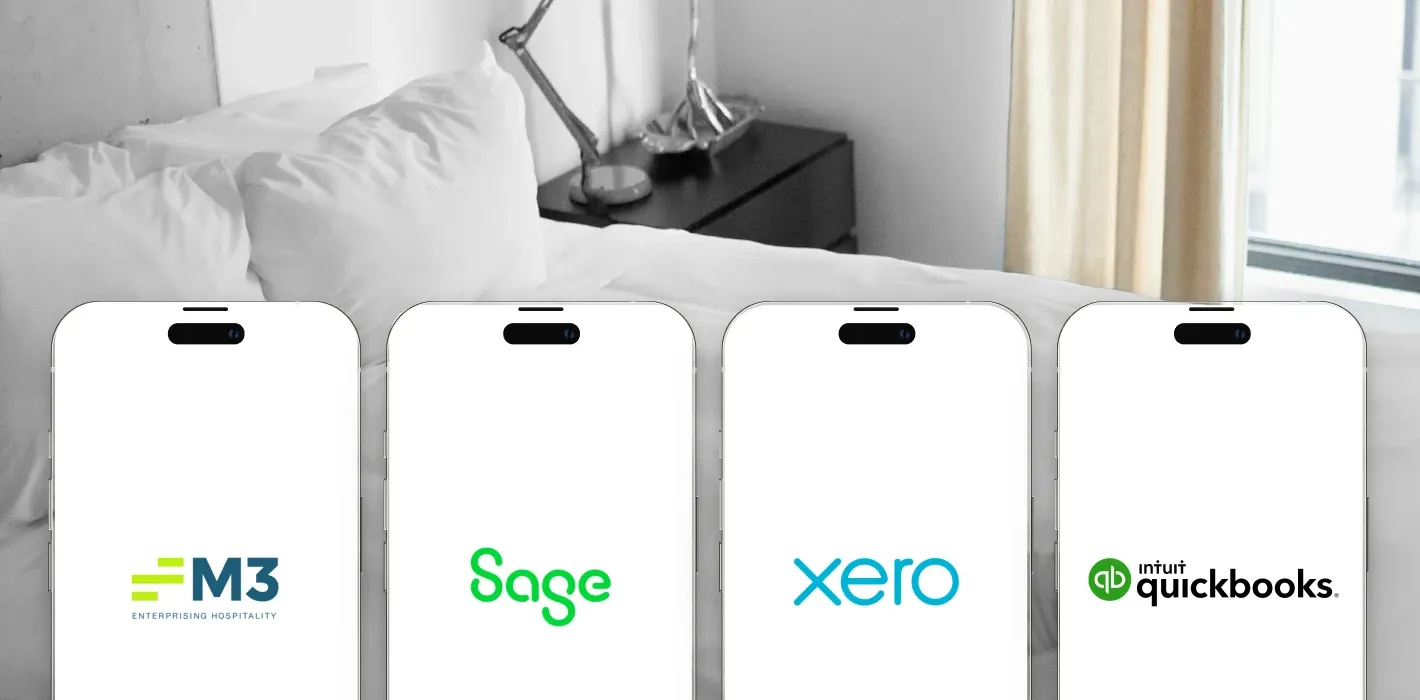

Hotel accounting plays a pivotal role in the success of any hotel, directly impacting profitability and operational efficiency. Managing multiple revenue streams, tracking expenses, and balancing fluctuating budgets can feel like a juggling act.
In this article, we’ll explore how hotel accounting software can transform your financial management, helping you stay compliant, simplify processes, and elevate your hotel’s economic health.

Hotel accounting is a specialized form of financial management and reporting for the dynamic hospitality industry. It maintains your hotel’s financial records and performance data. Hotels need to meticulously document, track, and analyze all financial activities.
Good hotel accounting ensures that the hotel’s financial data is easily accessible and understandable for hotel management. It also syncs with the rest of your operating systems, ensuring that every department receives the necessary financial information.
What makes hotel accounting unique is its focus on key areas like room bookings, food and beverage services, events, and other revenue streams. By mastering these practices, you’ll gain control over your budgeting, maintain a healthy cash flow, and generate precise financial insights for informed business decisions.
Hotel accounting covers a wide range of tasks designed to keep your finances clear and compelling. At the heart of it all is revenue management—tracking every income source, from room bookings and dining to events and beyond.
Maximizing revenue means staying sharp on occupancy rates and pricing strategies to bring in as much as possible. On the flip side, there’s expense control—managing payroll, utilities, supplies, and maintenance so you can keep costs lean and efficient.
Financial reporting is a big deal, too. Reports like cash flow statements, balance sheets, and profit and loss statements give you the insights you need to spot performance trends, tweak your strategies, and ensure you’re fully compliant.
And let’s not forget forecasting and budgeting. Estimating demand, setting clear financial goals, and anticipating any roadblocks can set you up for steady growth. With these tools, you’re not just managing the present—you’re building a future for your business.
A hotel should keep three main types of accounts:
1. Guest Accounts: For transactions between a guest and your hotel.
Example - When the guest orders food or books a spa appointment
2. Non-Guest Accounts: For transactions between your hotel and other parties.
Example - When suppliers receive your payments for monthly restocks
3. Management accounts: A report that provides information about hotel managers, owners, and third-party companies, as well as the overall health of the hotel. The data is usually updated on a quarterly basis.
Information gathered in these three types of accounts can be used to make financial statements, reports, and offers.
Hotel accounting systems are designed to meet the specific financial needs of the hotel industry. Unlike standard accounting software, hotel accounting systems are crafted to seamlessly integrate with every aspect of your hotel operations, including:
You can effortlessly track expenses, manage multiple income sources, and generate real-time financial reports all in one place. One of the most exciting features? The ability to manage room revenue like a pro.
By linking directly with your property management system (PMS), hotel accounting instantly captures bookings, cancellations, and changes. This means your income data is always fresh and accurate, significantly reducing the chance of errors.
But that’s not all. Hotel accounting systems also make food and beverage sales management a breeze. With automated bill entries from restaurants and bars, you’ll achieve precise sales tracking, freeing up your finance team to focus on what really matters.
Hotel accounting systems also empower you to keep a close eye on operating costs—think payroll, supplies, utilities, and maintenance. This means you can maintain profitability while keeping expenses in check.
Many of these systems even come equipped with automated payroll management tools, streamlining employee log-ins, pay calculations, and benefits administration.
Automation in hotel accounting reduces errors, streamlines processes, and provides actionable insights. These systems empower hotel operators to make smarter, data-driven decisions.
Automated systems handle everything from expense management and income tracking to transaction recording. This means your financial data, such as cash flow statements and income statements, stays accurate and up to date.
Studies show that automation can reduce accounting errors by up to 80%, which is huge for financial accuracy! It also saves time, eliminating tedious tasks like data entry and payroll processing, and frees up your team to focus on high-impact activities, such as financial planning and analysis. This shift increases productivity and lets your hotel adapt quickly to financial changes.
And there’s even more: Automation gives you real-time financial insights. You can instantly access crucial financial data, making it easy to track expenses, monitor cash flow, and generate reports on demand. This keeps you in tune with your hotel’s economic health, allowing you to adjust strategies, fine-tune pricing, or tighten cost control in response to current conditions.
 The right accounting software can transform your financial management.
The right accounting software can transform your financial management.
Here, we’ve rounded up four top-rated hotel accounting services and tools, each offering unique features to fit different operational needs and budgets. Let’s explore these options and find the ideal fit for your hotel’s financial needs.
M3 is the perfect hotel accounting tool designed just for the hospitality industry. With features like payroll integration, budgeting, accounts payable, and detailed financial reporting, it’s got everything you need.
Plus, you can manage your funds from anywhere, thanks to its cloud-based access, making collaboration with your team easy.
M3 offers customized pricing based on your hotel’s size, so you’ll get exactly what you need.
If you’re juggling multiple hotel locations, Sage Intacct is what you need. This powerful cloud-based solution integrates seamlessly with various property management systems and middleware tailored for the hospitality industry.
Its automation features make handling accounts payable and receivables super easy, plus you’ll get real-time financial insights at your fingertips. With Sage Intacct, you can keep a tight grip on costs and customize your pricing based on your needs, perfect for ambitious hoteliers looking to take control of their hotel accounting systems.
Xero is a cloud-based hotel accounting tool that makes managing hotel finances feel effortless. With its user-friendly interface and smooth integration with countless apps, Xero can handle everything from payroll to invoicing with ease.
It’s especially great for smaller hotel chains or independent spots, starting at just $13 per month.
QuickBooks Online
Join the ranks of millions who trust QuickBooks, a versatile hotel accounting solution. With features like automatic invoicing, cost control, payroll processing, and customizable reporting,
When you integrate it with your hotel management tools, everything, from financial reporting to booking management, becomes easier.
Starting at just $30 a month for small businesses, with additional features available for an extra $85, QuickBooks offers the flexibility to grow alongside your hotel.
Running a hotel is an exciting journey, but it also comes with its fair share of financial challenges that can affect your long-term success. Navigating shifting guest expectations, rising operational costs, and fluctuating demand is no small feat. Let’s explore some of the key hurdles you might face and how to turn them into opportunities for growth.
If you’ve ever felt the pinch during off-peak seasons, you’re not alone! Many hotels experience ups and downs in occupancy rates throughout the year. The trick is managing cash flow during those quieter times when fixed costs, such as salaries, utilities, and maintenance, remain constant. With effective financial planning, hospitality accounting software, and forecasting, you can weather these seasonal shifts and keep your cash flow healthy all year long.
Labor costs can be a significant burden, especially with today’s emphasis on personalized guest experiences. When you factor in maintenance, food and beverage supplies, and utilities, it’s easy to see how expenses can spiral. But here’s the good news: Implementing smart cost-cutting and resource management strategies can help you boost profitability without sacrificing quality. Imagine running a leaner operation that still delivers outstanding guest satisfaction!
The hotel industry is ever-evolving, and staying competitive often means investing in upgrades. Whether it’s integrating smart technology in your hotel accounting software, launching sustainability initiatives, or enhancing your services, these investments are crucial for keeping your hotel ahead of the curve. While the initial costs may seem daunting, think of them as building blocks for a more innovative and attractive hotel that guests can’t resist.
With the rise of online travel agencies (OTAs) and alternatives like Airbnb, pricing your rooms competitively can feel like a juggling act. To safeguard your profit margins and stay in the game, it’s essential to conduct real-time market analysis and adopt dynamic pricing strategies. This not only helps you stay competitive but also positions your hotel as a smart choice for savvy travelers.
Effective hotel accounting is the backbone of a successful operation, giving you the control needed to streamline financial processes and drive profitability. With the right tools, you can revolutionize your accounting and easily manage industry-specific challenges like capital investments and seasonal fluctuations.
Automating your hotel accounting means more time to focus on creating exceptional guest experiences and less time on manual financial tasks.
The top key performance indicators include RevPAR (Revenue Per Available Room), ADR (Average Daily Rate), occupancy rates, and GOP (Gross Operating Profit). By tracking these metrics, you’ll spot growth opportunities and make informed decisions.
Contact HotelSmarters to get full access to these metrics.
Automation dramatically cuts down on manual entry errors, accelerates reporting, and gives you real-time insights into your financial performance. Plus, automated hotel accounting systems can easily connect with other hotel management tools, simplifying everything from budget management to cash flow forecasting.
Hotel accounting software is designed just for you and your unique challenges. It comes packed with features like integrated revenue management, multi-currency support, and real-time reporting. These tailored tools empower you to manage your finances more effectively, providing insights that are perfectly aligned with the hospitality industry.
Co-founder / CTO
Armen is the CTO and Co-Founder of inoRain OTT and Co-Founder of HotelSmarters, specializing in advanced streaming technologies, OTT strategy, and interactive TV systems. He builds scalable end-to-end video delivery solutions and drives technical innovation across hospitality and streaming platforms, bridging complex engineering with practical business impact.